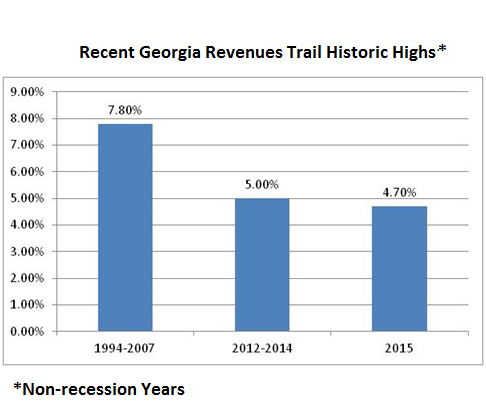 It was good to hear state leaders acknowledge the need to bolster the state’s finances this week at an Athens conference attended by veteran and newly elected lawmakers preparing for next year’s legislative session. A state study committee spent months to determine that Georgia’s years of neglect of its transportation system is now a detriment to economic development. A consensus is developing among business leaders, community leaders and the general public that it is time to act. The need just to get caught up is said to be $1 billion per year.
It was good to hear state leaders acknowledge the need to bolster the state’s finances this week at an Athens conference attended by veteran and newly elected lawmakers preparing for next year’s legislative session. A state study committee spent months to determine that Georgia’s years of neglect of its transportation system is now a detriment to economic development. A consensus is developing among business leaders, community leaders and the general public that it is time to act. The need just to get caught up is said to be $1 billion per year.
“If that means raising taxes to fund our roads, it means raising taxes to fund our roads,” Delta CEO Richard Anderson said this month.
The thing is, transportation is just one item on a list of Georgia’s urgent funding needs, a list that includes education, health care and public safety.
The need for new revenues becomes even more important in light of yet another mediocre state revenue report in November. The historically weak revenue growth of the past three years continued last month. Revenues grew only 4.3 percent compared with November 2013. Revenue growth was just 4.9 percent this fiscal year compared to the first five months of the last one.
In non-recession years from 1994 to 2007, revenues grew an average of 7.8 percent a year. Revenues grew less than 5 percent a year on average from the 2012 fiscal year through the first five months of this one. The difference between historic levels of revenue growth and the comparatively weak revenue growth now is about $600 million a year.
You can blame this weak revenue growth on the combination of a large number of unemployed Georgians and depressed wages for people who have jobs. Add in a narrowing of the tax base due to increased consumer spending on untaxed services and purchases over the Internet, as well as 20 years of tax cuts and special interest tax breaks, and it’s no wonder revenues aren’t rebounding as in past recoveries.
Continued revenue growth of 5 percent in the 2016 fiscal year creates about $1 billion of new revenues. According to Georgia’s Senate Appropriations Chair Jack Hill, spending for mandatory or obligated formula funds will take the lion’s share of new spending. That leaves little money to fully fund education, meet our transportation needs or fix our deteriorating public service infrastructure. A continued deterioration of state services is a barrier to a strong economy and a growing workforce.









